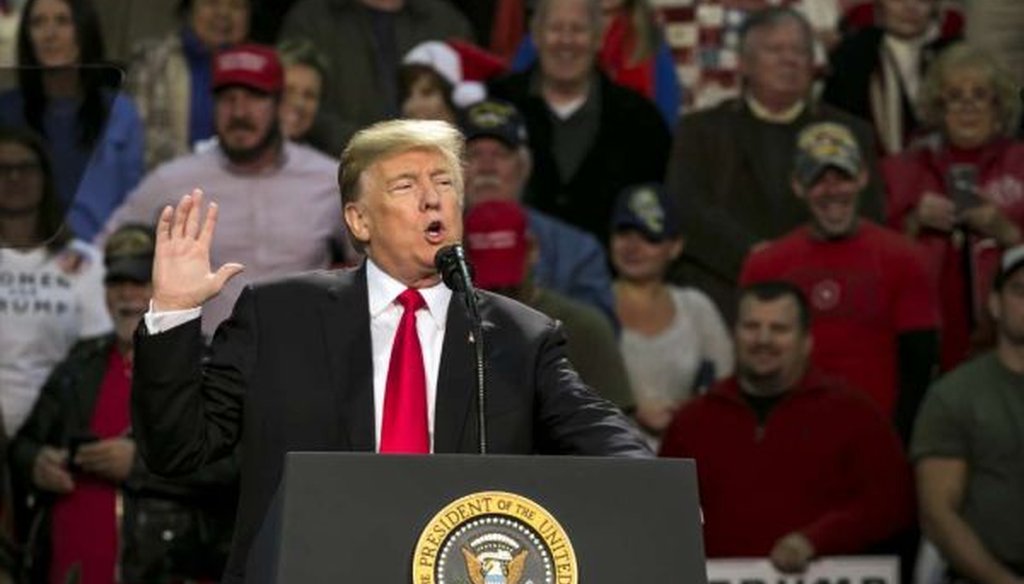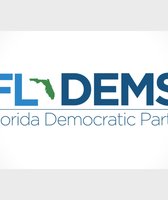Stand up for the facts!
Our only agenda is to publish the truth so you can be an informed participant in democracy.
We need your help.
I would like to contribute

President Donald Trump at a rally in Pensacola, Fla., on Dec. 8, 2017. (Bloomberg/Nicole Craine)
President Donald Trump’s shuttered golf course in Puerto Rico and questions about undocumented immigrants topped the list for most viewed Florida fact-checks of 2017.
Also fueling our most-clicked fact-checks was an unfounded claim about massive voter fraud in 2008 and a misleading statement from Trump that pre-existing conditions were included in the GOP health care bill. But it wasn’t all politics this year. In September, Florida was menaced by Hurricane Irma and our story debunking myths about hurricane preparedness also made the list.
Here's a look at the most clicked-on fact-checks and articles we published in 2017:
10. Do most mass shootings happen in gun-free zones?
In the wake of mass shootings at the Pulse nightclub in Orlando and at the Fort Lauderdale airport, Florida House Speaker Richard Corcoran, R-Land O’Lakes, argued that "most of these mass shootings take place in arenas where you're not allowed to have a concealed weapons permit."
Corcoran cited research by an advocate for gun rights who used a strict definition to define places where guns were not allowed. However, it is difficult to draw broad conclusions about the motivations of the perpetrators of mass shootings or whether they are influenced by gun restrictions, so we rated Corcoran’s statement Half True.
9. How many released Guantanamo Bay prisoners commit new terrorist acts?
U.S. Sen. Cory Gardner, R-Colo., said "about 30 percent of terrorists at Guantanamo Bay went back into battle. We know that a dozen or so killed Americans." We rated that Mostly True.
Gardner was on solid ground that "a dozen or so killed Americans." That stemmed from a 2015 Washington Post article based on interviews with government officials. The first part of the claim was also cited in the same article, but Gardner omitted that to get to the 30 percent figure requires adding those the Director of National Intelligence says were confirmed of re-engaging and those only suspected of re-engaging.
8. Following Trump voter fraud allegations, claim that 5.7 million noncitizens voted is wrong
Trump wasn’t the only person to make claims about about massive voter fraud this year. This summer, Fox & Friends co-host Ainsley Earhardt said 5.7 million "illegal immigrants might have voted" in 2008, but that’s wrong.
The number came from a study by Old Dominion University, which has been refuted by the experts who actually gathered the underlying data. The study was based on a survey which showed that 39 people out 32,800 claimed to be noncitizens who had voted. With a subset that small, experts also said the responses might be unreliable. We rated this statement False.
7. Trump overstates credit for $700 million in savings for F-35s
The Department of Defense announced a $728 million reduction on Feb. 3, 2017, for the aircraft. But Trump’s claim ignores the fact that the cost reduction for the Air Force variant of the F-35 had been in the works since before Trump announced his candidacy in June 2015.
Experts said the savings were a little higher than was initially projected, but all Trump did was elevate attention to the issue. All things considered, we rated this claim Mostly False.
6. Hurricane Irma: 5 myths about hurricane prep to forget
As Hurricane Irma approached Florida, PolitiFact Florida debunked five myths about hurricane preparedness. For example, it’s a rumor that taping up windows prevents them from shattering. Doing so can create larger, and more dangerous, shards of glass when the window busts. Plywood and shutters are the best way to go. Another myth: The dishwasher is a safe place to keep valuables you don't want to get wet. Don’t do that.
5. Is being in the United States unlawfully a 'crime'?
During a Florida House subcommittee hearing in March, an associate for the Florida Conference of Catholic Bishops said that unlawful presence is not a crime, but a civil violation.
We rated that Mostly True. It is generally accurate that the simple act of being in the United States illegally is not, by itself, a crime. Rather, it’s a civil violation that puts the individual at risk for deportation, but not for criminal prosecution. Still, it’s worth noting that someone who is unlawfully present might still have committed a related crime by entering the United States after having been deported, for instance, or entering in an illegal manner.
4. Do undocumented immigrants have constitutional rights?
We rated this Mostly True. Undocumented immigrants have many constitutional rights such as freedom of speech and religion. But they don’t share all the constitutional rights of citizens. For example, some undocumented immigrants in removal proceedings have not gotten due process in court, and they don’t have a right to a government-paid lawyer in immigration court.
3. Is Trump's immigration ban comparable to Obama's Cuba rule change?
U.S. Rep. Mario Diaz-Balart, a Cuban-American Republican from Miami-Dade County, defended Trump’s executive order banning entry of people from seven countries by comparing it with an action President Barack Obama took on Cuban refugees in his final days in office.
Experts said that Diaz-Balart is comparing two very different actions, so we rated this claim False. Trump’s order is far more broad and temporarily suspended entry for people from seven specific countries, as well as refugees from everywhere.
2. Does the GOP's new health care bill still cover pre-existing conditions, as Trump claims?
In an interview with CBS’ Face the Nation, Trump argued that the GOP’s health care plan covered pre-existing conditions. However, the reality is much more complicated than Trump makes it sound.
While Republican efforts to end Obamacare failed, the amendment in question at the time said that health insurers can’t limit access to coverage for people with pre-existing conditions, but that insurers can charge people more if states agree. In some states, health insurers would be able to charge sicker people more. And experts warned that high-risk pools -- the mechanisms meant to keep premiums lower for sick people -- might not be effective. We rated this claim Mostly False.
1. Did bankrupt Trump golf course in Puerto Rico leave taxpayers on the hook?
We rated this claim Half True. In April, the Florida Democratic Party fired back at President Donald Trump after he accused Democrats of using Puerto Rico’s debt as a bargaining chip before the deadline to settle the federal budget.
The group suggested that Trump shares blame in the island’s economic downfall. A Trump golf resort, the party said, crashed in Puerto Rico and hurt taxpayers. We found that the bankruptcy of the golf resort did leave taxpayers with a bill, and that Trump had pledged to turn things around. However, we found the claim omits certain details about the recession’s impact on the resort and its financial woes years before Trump’s involvement.
Spot a claim we should fact-check in 2018? Tweet us #PolitiFactThis or email [email protected]. Follow us @PolitiFactFL.
Our Sources
See individual fact-checks for sources















































